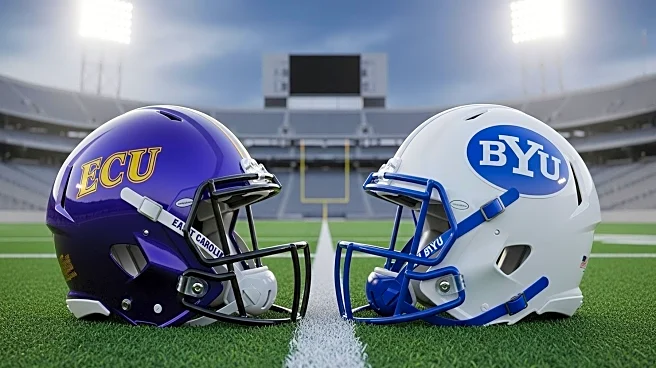What is the story about?
What's Happening?
East Carolina Pirates football team faced a defeat against BYU with a score of 34-13, marking their record at 2-2 for the season. The game took place in Greenville, N.C., where BYU's defense played a crucial role in limiting East Carolina to just 13 points. Freshman quarterback Bear Bachmeier led BYU with 246 passing yards and two touchdowns, showcasing a promising performance. East Carolina's head coach, Blake Harrell, expressed his willingness to schedule more games against BYU in the future, citing the positive impact on local businesses and the competitive nature of the series. The game marked the fourth encounter between the two teams, with each team winning two games in the series.
Why It's Important?
The game between East Carolina and BYU highlights the significance of college football in driving local economies and fostering community engagement. Coach Harrell's comments underscore the potential benefits of hosting high-profile games, which can boost local businesses such as hotels and restaurants due to increased visitor traffic. Additionally, the competitive nature of the series between East Carolina and BYU offers valuable experience and exposure for players, contributing to the development of college football programs. The outcome of the game also sets the stage for East Carolina as they prepare to enter league play against Army, emphasizing the need for strategic adjustments and improvements.
What's Next?
East Carolina is set to open league play against defending American Conference champion Army in five days. Coach Harrell emphasized the need for the team to address mistakes and prepare for the upcoming conference games. The quick turnaround requires the team to focus on recovery and strategic planning to enhance their performance. The Pirates will aim to leverage lessons learned from the BYU game to improve their gameplay and competitiveness in the conference.
Beyond the Headlines
The broader implications of East Carolina's loss to BYU extend beyond the immediate game results. The emphasis on scheduling competitive games reflects a strategic approach to enhancing the team's profile and attracting fan engagement. Such games can serve as a platform for showcasing talent and fostering sportsmanship, contributing to the cultural and social fabric of college sports. Additionally, the economic impact of hosting popular teams like BYU highlights the intersection of sports and local economies, offering insights into how sports events can drive economic activity and community development.
















